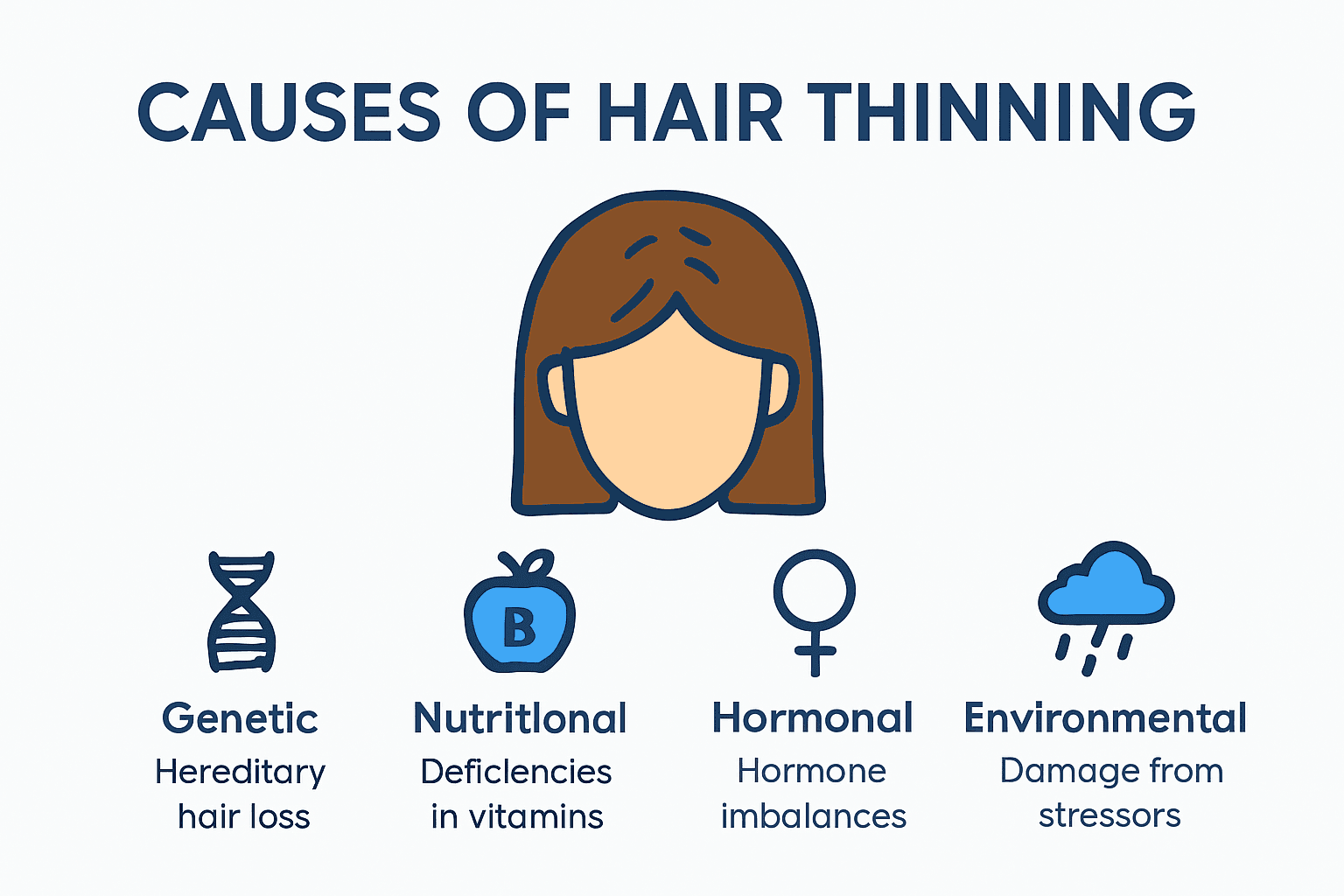Blog
Learning Materials
Thickening of Hair Naturally: Proven Methods for 2025
Updated: July 27, 2025

Thinning hair can feel like an unstoppable force, with more than 50 percent of women and 70 percent of men facing some form of hair thinning by age 50. Most people think their only hope lies in expensive salon treatments and harsh chemicals. Reality check. New research shows that everyday habits and natural remedies might be the real secret behind thicker hair in 2025.
Table of Contents
- Understanding Causes Of Hair Thinning
- Natural Remedies For Thicker Hair
- Daily Habits To Boost Hair Thickness
- Tracking Progress And Personal Solutions
Quick Summary
| Takeaway | Explanation |
|---|---|
| Understand the Causes of Hair Thinning | Identify genetic, nutritional, and environmental factors affecting hair health. |
| Utilize Natural Remedies | Incorporate essential oils and supplements like biotin to enhance hair thickness. |
| Adopt Daily Habits for Healthier Hair | Focus on nutrition and gentle styling practices to support robust hair growth. |
| Track Your Hair Progress Regularly | Measure changes in hair thickness to adjust treatments effectively. |
| Personalize Your Hair Care Routine | Create tailored strategies based on individual hair needs and responses to treatments. |
Understanding Causes of Hair Thinning
Hair thinning is a complex process influenced by multiple factors that interact in nuanced ways. Understanding these underlying causes is crucial for developing effective strategies for thickening of hair naturally.

Genetic and Hormonal Influences
Genetic predisposition plays a significant role in hair loss patterns. Research from Johns Hopkins Medicine reveals that family history can dramatically impact hair thickness and potential loss. Hormonal changes represent another critical factor, particularly during life stages like menopause, pregnancy, and aging.
Testosterone and dihydrotestosterone (DHT) interact with hair follicles, potentially causing miniaturization and reduced hair density. Thyroid imbalances can also trigger substantial hair thinning, disrupting the natural hair growth cycle and leading to noticeable changes in hair volume.
Nutritional and Health Factors
Nutritional deficiencies significantly contribute to hair thinning. The American Academy of Dermatology Association highlights specific nutritional gaps that can compromise hair health, including:
- Protein Deficiency: Insufficient protein intake reduces keratin production, weakening hair structure
- Iron Inadequacy: Low iron levels disrupt oxygen transportation to hair follicles
- Zinc Imbalance: Impacts hair protein synthesis and cell reproduction
Additionally, chronic medical conditions like autoimmune disorders, scalp infections, and systemic inflammation can trigger hair loss. Stress represents another critical factor, with prolonged psychological strain potentially disrupting normal hair growth cycles.
Environmental and Lifestyle Triggers
External factors play a substantial role in hair thinning. Cleveland Clinic notes that harsh hair treatments, excessive heat styling, chemicalprocessing, and tight hairstyles can cause significant mechanical damage to hair follicles.
UV radiation, pollution, and improper hair care routines further compromise hair health. Repeated chemical treatments, frequent heat styling, and aggressive brushing can lead to cumulative damage, gradually reducing hair thickness and resilience.
Understanding these diverse causes empowers individuals to take proactive steps in managing their hair health. By addressing underlying factors comprehensively, you can develop targeted strategies for naturally thickening hair and promoting long-term follicular wellness.
Here is a summary table that organizes the key causes of hair thinning for easier comparison and understanding.
| Cause | Description | Example Factors |
|---|---|---|
| Genetics & Hormones | Inherited traits and hormonal changes affect hair growth and density | Family history, menopause, pregnancy |
| Nutritional Deficiencies | Lack of vital nutrients compromises hair health | Low protein, iron, zinc |
| Health Conditions | Underlying medical issues can trigger hair loss | Thyroid imbalance, autoimmune issues |
| Environmental/Lifestyle | External stressors and hair practices damage hair and scalp | Heat styling, UV, pollution, tight styles, stress |
Natural Remedies for Thicker Hair
Natural remedies offer powerful alternatives for individuals seeking to enhance hair thickness without relying solely on synthetic treatments. These holistic approaches focus on nourishing hair follicles, stimulating growth, and improving overall hair health through botanically derived solutions.
Essential Oils and Botanical Extracts
Research from the International Journal of Trichology reveals remarkable potential in natural botanical treatments for hair thickening. Rosemary oil emerges as a standout remedy, demonstrating clinical efficacy comparable to conventional hair growth treatments. Its active compounds stimulate blood circulation in the scalp, encouraging follicle nutrition and potentially reversing miniaturization.
Other potent botanical extracts include:
- Peppermint Oil: Enhances microcirculation and potentially stimulates hair follicle activity
- Lavender Oil: Supports scalp health and may reduce stress-related hair thinning
- Thyme Oil: Demonstrates antimicrobial properties that support scalp wellness

Nutritional Supplementation Strategies
A clinical trial published in Evidence-Based Complementary and Alternative Medicine highlighted pumpkin seed oil as a promising natural intervention for hair growth. Oral supplementation demonstrated significant improvements in hair count and thickness, particularly for individuals experiencing androgenetic alopecia.
Key nutritional supplements that support natural hair thickening include:
- Biotin: Supports keratin infrastructure and promotes hair strength
- Zinc: Critical for protein synthesis and cellular reproduction
- Omega-3 Fatty Acids: Reduces inflammation and supports follicle health
Holistic Scalp Care Techniques
Natural hair thickening extends beyond topical treatments and supplements. Holistic approaches encompass lifestyle modifications and gentle scalp care techniques. Practices like scalp massage using natural oils can stimulate blood flow, potentially encouraging hair growth and improving follicle resilience.
Additional natural strategies involve:
- Minimizing heat styling
- Using silk or satin pillowcases
- Implementing stress reduction techniques
- Maintaining balanced nutrition
These comprehensive approaches work synergistically to support natural hair growth and thickness. By integrating botanical remedies, targeted nutrition, and mindful hair care practices, individuals can develop a holistic strategy for achieving fuller, healthier hair without relying exclusively on synthetic interventions.
Below is a comparison table of natural remedies and how they benefit hair thickness.
| Natural Remedy | How It Supports Hair Thickness | Example Use/Source |
|---|---|---|
| Rosemary Oil | Boosts scalp circulation, stimulates follicles | Scalp massage, essential oil |
| Peppermint Oil | Increases microcirculation, may aid growth | Scalp massage |
| Lavender Oil | Promotes scalp health, reduces stress | Scalp/applications |
| Thyme Oil | Fights scalp microbes, supports wellness | Oil blends for scalp |
| Biotin | Strengthens hair structure, promotes growth | Oral supplement |
| Zinc | Supports protein synthesis and cell growth | Oral supplement |
| Omega-3 Fatty Acids | Reduce inflammation, maintain follicle health | Eggs, fish, supplement |
| Pumpkin Seed Oil | Shown to improve hair count and thickness | Oral supplement |
Daily Habits to Boost Hair Thickness
Developing consistent daily habits can significantly impact hair thickness and overall hair health. By implementing strategic practices, individuals can create an environment that supports robust hair growth and minimizes potential damage.
Nutritional Foundations for Hair Health
Harvard Health emphasizes the critical role of nutrition in maintaining healthy hair. B vitamins play a crucial part in supporting hair structure and growth. Specifically, thiamin (B1), riboflavin (B2), and biotin (B7) help convert nutrients into energy that supports hair follicle function.
Key dietary recommendations include:
- Protein-Rich Foods: Eggs, lean meats, and legumes provide essential amino acids
- Vitamin-Dense Choices: Fortified cereals, nuts, and green vegetables
- Hydration: Drinking adequate water supports overall hair and scalp health
Healthline suggests incorporating specific nutrients like seaweed, which contains omega-3 fatty acids and vitamins that promote hair thickness and strength.
Hair Care and Styling Practices
The American Academy of Dermatology provides critical guidance on protecting hair from daily damage. Gentle handling and mindful styling can prevent breakage and support hair thickness.
Essential daily hair care habits include:
- Gentle Washing: Use mild shampoos that clean without stripping natural oils
- Careful Drying: Pat hair dry instead of rubbing vigorously
- Minimal Heat Styling: Limit use of blow dryers, straighteners, and curling irons
- Protective Hairstyles: Avoid tight ponytails or braids that cause tension
Stress Management and Lifestyle Considerations
Stress can significantly impact hair health, potentially leading to increased hair thinning. Implementing daily stress reduction techniques can support overall hair thickness and growth. Practices such as meditation, regular exercise, and adequate sleep contribute to hormonal balance and reduced physiological stress.
Additional lifestyle recommendations:
- Practice consistent sleep schedules
- Engage in regular physical activity
- Manage mental health through mindfulness techniques
- Maintain a consistent self-care routine
By integrating these comprehensive daily habits, individuals can create a holistic approach to maintaining and improving hair thickness. Consistency is key in supporting long-term hair health and achieving the desired fullness and volume.
Tracking Progress and Personal Solutions
Effective hair thickening requires a personalized approach that combines systematic tracking, targeted interventions, and consistent evaluation. Understanding individual hair characteristics and response to treatments is crucial for developing successful long-term strategies.
Measuring Hair Thickness and Growth
Healthline suggests implementing multiple measurement techniques to accurately track hair health. Precise documentation helps individuals understand their unique hair growth patterns and the effectiveness of chosen interventions.
Key tracking methods include:
- Photographic Documentation: Monthly side-by-side comparative images
- Precise Measurements: Using digital calipers to measure hair strand diameter
- Scalp Microscopy: Analyzing follicle density and hair shaft conditions
- Digital Hair Analysis: Utilizing advanced imaging technologies for comprehensive assessment
Quantitative tracking allows for data-driven adjustments to your hair thickening strategy, enabling more targeted and effective interventions.
Personalized Treatment Strategies
Verywell Health emphasizes the importance of creating individualized hair care routines. Recognizing that each person's hair responds differently to treatments, developing a customized approach is essential for achieving optimal results.
Recommended personalization strategies include:
- Comprehensive Nutritional Assessment: Identifying specific dietary deficiencies
- Scalp Microbiome Analysis: Understanding individual scalp health conditions
- Genetic Predisposition Evaluation: Assessing hereditary hair characteristics
- Lifestyle Impact Review: Examining stress, sleep, and environmental factors
Monitoring and Adapting Solutions
Medical News Today highlights the dynamic nature of hair health, stressing the importance of continuous monitoring and flexible interventions. Regular reassessment ensures that your hair thickening strategy remains effective and responsive to changes.
Key adaptation principles:
- Conduct quarterly comprehensive hair and scalp evaluations
- Be prepared to modify treatments based on observed results
- Consult healthcare professionals for persistent concerns
- Maintain detailed progress journals
Successful hair thickening is not a one-size-fits-all approach but a personalized journey of consistent observation and strategic adjustments. Learn more about developing your personalized hair growth plan to achieve the most effective and sustainable results.
By combining scientific tracking methods, personalized interventions, and adaptive strategies, individuals can develop a comprehensive approach to naturally thickening their hair and maintaining long-term hair health.
Frequently Asked Questions
What are the main causes of hair thinning?
Hair thinning can be caused by genetic and hormonal influences, nutritional deficiencies, health conditions, and environmental or lifestyle factors like harsh treatments and stress.
What natural remedies can help thicken hair?
Natural remedies include essential oils like rosemary and peppermint, nutritional supplements such as biotin and zinc, and holistic scalp care techniques like gentle massages and balanced nutrition.
How can I improve my daily habits for healthier hair?
To boost hair thickness, focus on consuming a balanced diet rich in protein and vitamins, practice gentle hair care methods, and manage stress through techniques like meditation and regular exercise.
How can I track my hair progress?
You can track hair thickness by taking monthly photographs, measuring hair strand diameter, analyzing follicle health through scalp microscopy, and maintaining a detailed progress journal to observe changes over time.
Ready for Thicker, Healthier Hair? Discover the Power of True Personalization
Struggling with hair thinning can be overwhelming, especially when natural methods do not always deliver consistent results. You already know that everyone’s hair is different. As the article discussed, genetics, nutrition, and daily habits all work together in unique ways. Standard routines and generic solutions can leave you feeling stuck, never sure if real progress is happening.

Let MyHair.ai unlock the path to thicker hair with science-backed, AI-powered analysis built for your individual needs. Upload a simple scan and see your progress with precise assessments, personalized growth projections, and product recommendations designed just for you. Why wait for change when your custom hair transformation can start today? Take your first step now by visiting MyHair.ai and experience a smarter way to thicker hair. To learn more about tracking and optimizing your hair journey, check out our latest guide on how to get thicker hair, naturally and effectively.